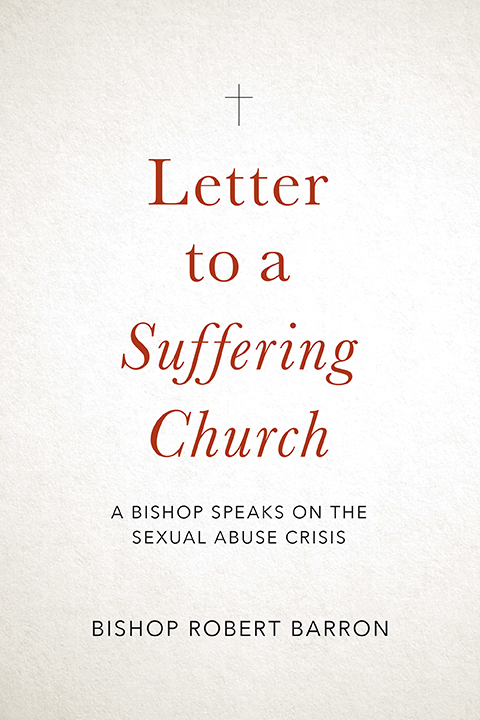The title of Bishop Robert E. Barron’s “Letter to a Suffering Church” led me — as a survivor of childhood sexual abuse — to hope for a book like Fr. Thomas Berg’s excellent 2017 work “Hurting in the Church.”
‘Letter to a Suffering Church: A Bishop Speaks on the Sexual Abuse Crisis’
Author: Bishop Robert E. Barron, Auxiliary Bishop of Los Angeles
Publisher: Word on Fire (Park Ridge, Illinois)
Release Date: July 22, 2019
Length: 105 pp.
Cost: Free plus $5.95 shipping and handling.
Fr. Berg wrote for Catholics who were victimized by fellow Catholics. Using St. Paul’s image of the Church as body of Christ, he sought to help wounded readers come to see how the Church’s fundamental holiness remains despite the sins of individual members.
Bishop Barron, an auxiliary bishop of the Los Angeles Archdiocese, echoes some of Fr. Berg’s points — he observes that the Church “is an organism, not an organization” — but with a different aim. His book is not for those who are themselves suffering; a more apt title would be “Letter to a Scandalized Church.” Bishop Barron’s mantra, repeated seven times across 105 pages, is that Catholics angry about clergy abuse should not leave the Church but should rather “stay and fight.”
What we have here, then, is a pugilistic, often polemic book — heavy on seething, light on healing. Bishop Barron writes that “sexual abuse of young people … is a rot, a disease, a threat to the great principles of the Church that we hold dear.” The answer is to “fight by raising your voice in protest; fight by writing a letter of complaint; fight by insisting that protocols be followed; fight by reporting offenders; fight by pursuing the guilty until they are punished; fight by refusing to be mollified by pathetic excuses.”
On the positive side, Bishop Barron advises, “fight by your very holiness of life; fight by becoming the saint that God wants you to be; fight by encouraging a decent young man to become a priest; fight by doing a Holy Hour every day for the sanctification of the Church; fight by coming to Mass regularly; fight by evangelizing; fight by doing the corporal and spiritual works of mercy.”
There is nothing inherently wrong in this approach and much to appreciate. Certainly, Bishop Barron’s tone is preferable to that of some prelates who have failed to show appropriate anger over abuse.
Nonetheless, it is disappointing that Bishop Barron omits any mention whatsoever of how the reader might fight abuse by personally accompanying victims.
Catholic ministries aiding abuse victims may be few, but they do exist. In Bishop Barron’s hometown of Chicago, the archdiocesan Domestic Violence Outreach trains parishes to become welcoming places for those who have suffered abuse at home; surely something similar could be done for victims of clergy abuse. In the Diocese of Charleston, South Carolina, the Foundation of Peace organizes days of healing for survivors. And on the grassroots level, the Maria Goretti Network, founded by a clergy abuse survivor and a diocesan priest, helps parishes across the United States form victim-led support groups so survivors may heal in an atmosphere of prayer and fellowship.
The back cover of “Letter to a Suffering Church” says “all profits from the sale of this book will go directly to organizations who support sexual abuse victims.” That’s good. But why doesn’t Bishop Barron identify those organizations so his readers might likewise support them? Why, in encouraging readers to practice “corporal and spiritual acts of mercy,” does he fail to identify even one concrete means by which they might bring such mercy, beyond attending Holy Hour?
Pope Francis said in his first papal interview that “the thing the Church needs most today is the ability to heal wounds and to warm the hearts of the faithful.” What is most lacking in Bishop Barron’s book is this vision of the Church as a “field hospital” where “we must accompany people.”
It is easy to denounce abuse and say that the faithful are right to be angry about it. What is not easy — neither for Bishop Barron, nor, it seems, for the U.S. bishops at large — is to exhort the faithful to take appropriate initiatives, in union with their shepherds, to respond to the need for healing in their own communities.
— By Dawn Eden Goldstein, Catholic News Service. Goldstein, who holds a doctorate in theology, is the author of several books, including “My Peace I Give You: Healing Sexual Wounds with the Help of the Saints” and “Remembering God’s Mercy: Redeem the Past and Free Yourself From Painful Memories.”







